Related Research Articles

Uprising is the twelfth studio album by Bob Marley and the Wailers and the final studio album released during Marley's lifetime. Released on 10 June 1980, the album is one of Marley's most directly religious, with nearly every song referencing his Rastafarian beliefs, culminating in the acoustic recording of "Redemption Song".

Exodus is the ninth studio album by Jamaican reggae band Bob Marley and the Wailers, first released in June 1977 through Island Records, following Rastaman Vibration (1976). The album's production has been characterized as laid-back with pulsating bass beats and an emphasis on piano, trumpet and guitar. Unlike previous albums from the band, Exodus thematically moves away from cryptic story-telling; instead it revolves around themes of change, religious politics, and sexuality. The album is split into two halves: the first half revolves around religious politics, while the second half is focused on themes of making love and keeping faith.

Kaya is the tenth studio album by the Jamaican band Bob Marley and the Wailers, released in 1978. The album consists of tracks recorded alongside those released on the Exodus album. It was produced by the band.
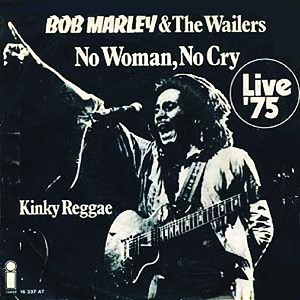
"No Woman, No Cry" is a reggae song by Bob Marley and the Wailers. The song was recorded in 1974 and released on the studio album Natty Dread.

Bob Marley and the Wailers were a Jamaican ska, rocksteady and reggae band. The founding members, in 1963, were Bob Marley, Peter Tosh, and Bunny Wailer.

Stephen Robert Nesta Marley is a Jamaican-American musician. The son of Bob Marley, Marley is an eight-time Grammy Award winner, three times as a solo artist, twice as a producer of younger brother Damian Marley's Halfway Tree and Welcome to Jamrock albums, and a further three times as a member of his older brother Ziggy Marley's group Ziggy Marley & The Melody Makers.

"Redemption Song" is a song by Jamaican singer Bob Marley. It is the final track on Bob Marley and the Wailers' twelfth album, Uprising, produced by Chris Blackwell and released by Island Records. The song is considered one of Marley's greatest works. Some key lyrics derived from a speech given by the Pan-Africanist orator Marcus Garvey titled "The Work That Has Been Done", which Marley publicly recited as early as July 1979 during his appearance at the Amandla Festival.

Legend is a compilation album by Bob Marley and the Wailers. It was released on 7 May 1984 by Island Records. It is a greatest hits collection of singles in its original vinyl format and is the best-selling reggae album of all-time, with over 12 million sold in the US, over 3.3 million in the UK and an estimated 25 million copies sold globally. In 2003, the album was ranked number 46 in Rolling Stone magazine's list of the "500 Greatest Albums of All Time", maintaining the ranking in a 2012 revised list, but dropping to number 48 in the 2020 revised list.
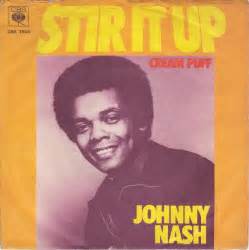
"Stir It Up" is a song composed by Bob Marley in 1967 and first recorded by the group Bob Marley and the Wailers that year and issued as a single. It was later covered by American singer Johnny Nash on his 1972 album I Can See Clearly Now. The following year, Marley and the Wailers re-recorded the song for their album Catch a Fire.
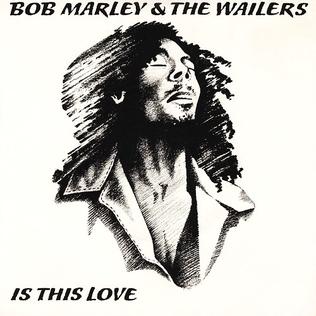
"Is This Love" is a song by Bob Marley and the Wailers, released on their 1978 album Kaya. The song became one of the best-known Marley songs and was part of the Legend compilation. It peaked at number 9 in the UK charts upon its release in 1978. A live rendition of the song can be found on the Babylon by Bus live album from Paris in 1978.

"Buffalo Soldier" is a reggae song written by Bob Marley and Noel "King Sporty" Williams and recorded by Jamaican band Bob Marley and the Wailers. It did not appear on record until the 1983 posthumous release of Confrontation when it became one of Marley's best-known songs. The title and lyrics refer to the black US cavalry regiments, known as "Buffalo Soldiers", that fought in the Native American Wars after 1866. Marley linked their fight to a fight for survival and recasts it as a symbol of black resistance.

"Three Little Birds" is a song by Bob Marley and the Wailers. It is the fourth track on side two of their 1977 album Exodus and was released as a single in 1980. The song reached the Top 20 in the UK, peaking at number 17. It is one of Marley's most popular songs and has been covered by numerous other artists. The song is often thought to be named "Don't Worry About a Thing" or "Every Little Thing is Gonna Be Alright", because of the prominent and repeated use of these phrases in the chorus.
"One Love" is a ska song written by Bob Marley and recorded by his group the Wailers from their 1965 debut studio album The Wailing Wailers. It was rerecorded as part of the 1970 medley "All in One", which contained reggae reworkings of their early ska songs. This was released as a single and is also included on the compilation African Herbsman under the name "All in One".
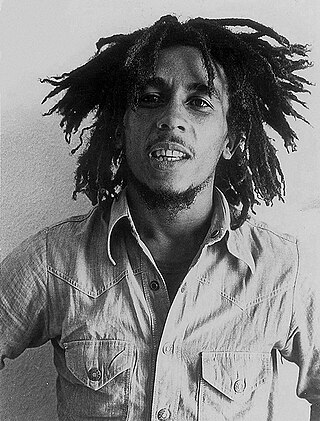
Robert Nesta Marley was a Jamaican reggae singer, guitarist, and songwriter. Considered one of the pioneers of the genre, Marley fused elements of reggae, ska, and rocksteady in his music and was renowned for his distinctive vocal and songwriting style. Marley's contribution to music increased the visibility of Jamaican music worldwide and made him a global figure in popular culture. Over the course of his career, Marley became known as a Rastafarian icon, and he infused his music with a sense of spirituality. He is also considered a global symbol of Jamaican music and culture and identity, and was controversial in his outspoken support for democratic social reforms. He also supported legalisation of cannabis, and advocated for Pan-Africanism. In 1976, Marley survived an assassination attempt in his home, which was believed to be politically motivated.

"Waiting in Vain" is a song written by reggae musician Bob Marley and recorded by Bob Marley and the Wailers, for their 1977 album Exodus. Released as a single, it reached number 27 on the UK Singles Chart.

"Could You Be Loved" is a 1980 song by Jamaican reggae band Bob Marley and the Wailers. It was released as the first single from their twelfth and last album, Uprising (1980), and is also included on their greatest-hits album Legend (1984). It was written in 1979 on an aeroplane while The Wailers were experimenting on guitar. In the middle of the song, background singers quote a verse from Bob Marley's first single "Judge Not": "The road of life is rocky; And you may stumble too. So while you point your fingers, someone else is judging you". Instruments used on the original record of this song are guitars, bass, drums, acoustic piano, the Hohner clavinet and an organ, as well as the Brazilian cuíca. "Could You be Loved" was very successful on the charts in Europe, peaking within the top 10 in Belgium, France, Ireland, Italy, the Netherlands, Norway, Spain, Switzerland and the UK. Additionally, it was a top 20 hit in Sweden and West Germany.

One Love: The Very Best of Bob Marley & The Wailers is a compilation album of Bob Marley and the Wailers songs that was released on the Island Records label in 2001.

Natural Mystic: The Legend Lives On is a collection of album tracks by Bob Marley, and is an addendum to the 1984 compilation album, Legend.
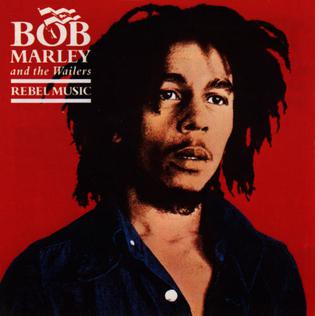
Rebel Music is a compilation album by Bob Marley & The Wailers released by Island Records in 1986. It consists of tracks drawn from such albums as Catch A Fire, Natty Dread, Live!, Rastaman Vibration, Babylon By Bus, and Survival, as well as an exclusive remix of "Rebel Music " and the first album appearance of 1977 B Side "Roots". The album includes the hit singles "So Much Trouble in the World", "War / No More Trouble", and "Get Up, Stand Up". Some of the vinyl pressings include a looping sound at the end groove of side A, apparently the noise at the ending of Bob Marley & The Wailers's "Satisfy My Soul", released 1978 on the album Kaya by Tuff Gong/Island. The remastered edition of the CD features "Wake Up And Live " as a bonus track. Both parts had previously appeared on either side of a rare single in 1979, here they are mixed together to form one track.
"So Much Trouble in the World" is a song by Bob Marley and the Wailers, which was released in 1979 off their album Survival released in the same year. The song peaked at number 56 in the UK charts.
References
- ↑ "Bob Marley & the Wailers – Satisfy My Soul". Australian-charts.com. Retrieved 11 April 2024.
- ↑ "Bob Marley & The Wailers - Satisfy My Soul". YouTube . 24 April 2019. Retrieved 23 April 2022.
- ↑ "Bob Marley and the Wailers: Artist Chart History". Official Charts Company. Retrieved 23 August 2021.
- ↑ "British single certifications – Bob Marley & The Wailers – Satisfy My Soul". British Phonographic Industry . Retrieved 4 May 2024.